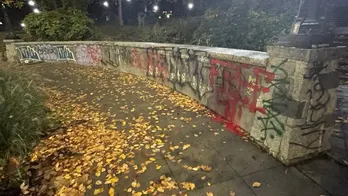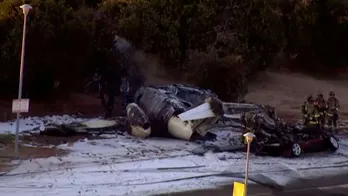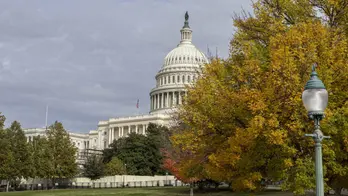State line pot shops latest flashpoint in Idaho-Oregon border debate
ONTARIO, Ore. — When Steven Meland and his business partner opened up Hotbox Farms in the small eastern Oregon city of Ontario they knew there was a big opportunity lying just across the Snake River.
Ontario, population 11,600, is less than an hour's drive from Idaho's largest metro area, Boise, population 700,000 and growing, where marijuana of all kinds - including medical - is illegal.
"The politicians have been able to have this scenario where they say that they don't have legal cannabis," Meland says. "But in all actuality we all know there's legal cannabis in Boise."
Hotbox Farms is a big player in an economic boom that's happened since Ontario allowed recreational pot shops in 2018. There are now twelve dispensaries in this small farming town once mostly known for inventing the tater tot. Ontario now sells more pot per capita than anywhere else in Oregon. The industry employs about 600 people. Many get health insurance and most - like their customers - appear to be commuting over here from Idaho.
That's where Meland is from too.
"There is over a million people within a hundred mile radius of the store," Meland says. "Of course they are serving a broader market."
But this boom has quickly become the latest flashpoint in a larger political and cultural battle that's been heating up since 2020, when a group of Oregonians from the rural eastern side of the state first began circulating petitions about a proposal to secede from the largely blue state and join conservative Idaho.
How "Greater Idaho" took shape
Folks in rural America have long complained about having to live under laws made people by who live mostly in cities. For decades the most high profile example in the West has been the so-called State of Jefferson, referring to the largely natural resource dependent regions of northern California and southern Oregon where some people have long felt disconnected from powerful cities like San Francisco and Portland.
Today, Portland looms large in a more recent push to create "Greater Idaho."
Some in sparsely populated eastern Oregon say they feel so divorced from the politics of the liberal city and the West Coast that they're asking for an actual divorce.
This year in the Idaho Legislature - where Republicans hold a supermajority - the effort has gained some traction, lately over what's been happening in Ontario.
"We have a little bit of a drug problem right on the side of our border," said Rep. Barbara Ehardt, a Republican from Idaho, at a recent state legislative hearing over a bill that would authorize Idaho to begin talks with Oregon lawmakers about moving the border.
"A lot of Idahoans are going there [Ontario] and getting drugs, Ehart said, "and that will be pushed hundreds of miles away."
Her Greater Idaho measure recently passed the Idaho House.
The urban rural divide is at the heart of Greater Idaho
Pushing Idaho's border hundreds of miles West is just one of a litany of far right bills introduced in Idaho's Republican supermajority legislature. Others have included a proposal to make it a crime for doctors to administer Covid vaccines or if someone helps a girl under 18 get an abortion.
By contrast, Oregon voters recently decriminalized small amounts of hard drugs like cocaine and heroin and approved tighter gun laws. These hot button issues have long been unpopular in the sparsely populated lands east of the Cascade Mountains.
Many small farming and ranching communities have been hit hard by addiction and folks will also tell you it can take a sheriff's deputy an hour or more to respond to a call. Rural eastern Oregon is also predominately federal public land, long a source of tension and even violence in this corner of the West.
"The partisanship has grown and just the cultures have grown apart," says Matt McCaw, an Oregon resident and spokesperson for the group Citizens for Greater Idaho.
The group helped convince eleven eastern Oregon counties to pass resolutions in support of being annexed into Idaho.
One of them is Malheur County, where Ontario is, and where long time local Ron Jacobs sits on the county commission.
"We just feel like our conservative values are different than theirs," Jacobs says. "They pass so many laws over there that they don't even take us into consideration we're kind of a step child over here in eastern Oregon."
While Idaho entrepreneurs are keen on crossing the Snake River over into Oregon to start marijuana businesses, Jacobs sees a trend going in the other direction. Farmers and ranchers, he says, are increasingly looking to relocate some or all of their business in Idaho.
"We have farmers moving across the river to get their residency in Idaho to keep from having to pay [higher] inheritance taxes," he says, adding that it's helping some families to keep from selling their farms.
Jacobs says most of his constituents feel more politically aligned to Idaho. But the ask is also practical: parts of Malheur County are considered adjoined to the Boise metro area, home to the region's major shopping, entertainment and airport.
Is Greater Idaho really a possibility?
Jacobs knows Greater Idaho is a long shot. Even if both state legislatures were to approve it, it would still take an act of Congress to begin to move forward.
But he believes it's started an important conversation.
So too does Steven Meland, the owner of Hotbox in Ontario, albeit for a far different reason. He thinks the revived debate inside his home state's legislature may actually backfire and end up building more support for legalizing marijuana in Idaho.
The industry is betting on the cultural and political divide over legal pot evaporating in the face of another conservative value - the free market.
"Remember that Ontario was conservative right wing Ontario just a couple years ago as well, they always said they've never ever legalize," Meland says.
But today the town brings in well over two million dollars a year in taxes from dispensaries like this.
"People don't find cannabis to be this big scary thing that historically politicians have made it out to be," Meland says. "When given the opportunity to vote on legal cannabis the vast majority of times they choose to have it."
And in Ontario anyway, marijuana is starting to look pretty mainstream. Some of the dispensaries help with town clean up projects and partner with local charities for Covid relief and coat drives. There are also two more dispensaries set to open.
That will soon bring the total operating here to fourteen, at least for now.
Disclaimer: The copyright of this article belongs to the original author. Reposting this article is solely for the purpose of information dissemination and does not constitute any investment advice. If there is any infringement, please contact us immediately. We will make corrections or deletions as necessary. Thank you.







